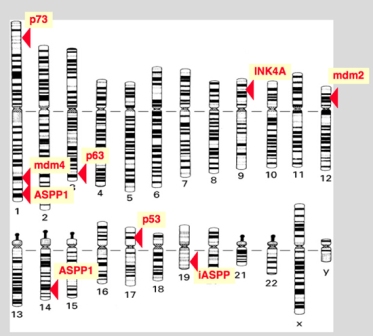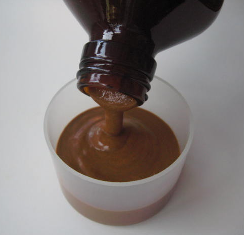On the other hand, genistein is a multifunctional inhibitor of cancer cell growth. It induces apoptosis in virtually every cancer cell tested. It also kills tumors in clinical trials.
One of the most important tumor suppressor genes is TP53 (more commonly known as p53). This gene was originally identified as a germ-line mutation in the rare inherited cancer called Li-Fraumeni Syndrome, but it has since been shown to be involved in a wide variety of cancer types. The p53 gene is lost (e.g., the gene is deleted from the chromosome) in about 50 percent of all cancerous cells.
 The p53 protein is responsible for controlling the cell cycle checkpoint at the stage where the cell makes a decision to duplicate its genome, called the G2/S boundary. Along with p21 (another essential protein at this boundary), p53 protein monitors the state of the DNA to ensure that the genome is intact and not damaged. The S phase is where the genome is duplicated to get ready for cell division, so it is important that any damage and errors be repaired. If the cell is unable to repair the damage to its DNA, p53 can induce the programmed cell death pathway (called apoptosis) that kills off the cell, thus preventing division of a cell with damaged DNA. If p53 is not functional, the cell cycle is not arrested and any errors will be duplicated and passed on when the cell divides.
The p53 protein is responsible for controlling the cell cycle checkpoint at the stage where the cell makes a decision to duplicate its genome, called the G2/S boundary. Along with p21 (another essential protein at this boundary), p53 protein monitors the state of the DNA to ensure that the genome is intact and not damaged. The S phase is where the genome is duplicated to get ready for cell division, so it is important that any damage and errors be repaired. If the cell is unable to repair the damage to its DNA, p53 can induce the programmed cell death pathway (called apoptosis) that kills off the cell, thus preventing division of a cell with damaged DNA. If p53 is not functional, the cell cycle is not arrested and any errors will be duplicated and passed on when the cell divides.
A cellular phosphoprotein that binds to and inactivates p53 has been identified as a product of the oncogene MDM2. MDM2 plays a major role in cancer development and progression via both p53-dependent and -independent functions. One of its p53-independent functions is the induction of the ubiquitin-independent proteasomal degradation of p21Waf1. MDM2, the inhibitor of p53 stability in the cell, was downregulated by genistein at both the genetic and protein levels. In a dose- and time-dependent manner, genistein reduced MDM2 protein and mRNA levels in human cell lines of breast, colon, and prostate cancer; primary fibroblasts; and breast epithelial cells. The MDM2 gene is also overexpressed in some types of leukemias and lymphomas. This downregulation results in an increase in p53 protein levels and activity in the nucleus.
MDM2 promotes proteasomal degradation of p21Waf1 via a conformation change.
MDM2 and MDM4: p53 regulators as targets in anticancer therapy.
Overexpression of the MDM2 oncogene in leukemia and lymphoma.
C-Myc is a genetic factor which stimulates the hyperproliferation of various cells. In general, c-myc alone does not cause cancer. But it does promote cellular growth. This is the first step in the eventual development of cancer cells. Hyperactivated c-myc has been identified in 80% of all cancers and leukemias. If you have cancer, turning off c-myc over expression would be a “good thing”. The following paper shows that the over expression of c-myc AND the downregulation of p53, a tumor suppressor gene, are the only two steps necessary for the development of B cell lymphomas.
In addition, genistein promotes the inactivation of the c-myc gene. Genistein can increase p53 activity while inhibiting c-myc expression.
Chromosome-mediated alterations of the MYC gene in human cancer.
BRCA1 is a breast cancer susceptibility gene that was first identified in 1994. People carrying a mutation (abnormality) in this gene are at an increased risk of breast or ovarian cancer. The normal gene plays a role in repairing breaks in DNA. However, when the gene is mutated it is thought that this repair function may become disabled thus leading to more DNA replication errors and cancerous growth. Growth of BRCA1 mutant cells was strongly inhibited by genistein.
Breast cancer cell response to genistein is conditioned by BRCA1 mutations.
AKT is an enzyme that plays a critical role in growth control. It is activated by the PI-3K signaling pathway. The AKT enzyme is responsible for the activation of aerobic glycolysis, the metabolic pathway which typifies cancer cell growth. AKT plays many roles in promoting cellular growth/survival. Genistein inhibits AKT activity by different biochemical pathways.
Anticancer therapeutic potential of soy isoflavone, genistein.
Cytotoxic activity of epidermal growth factor-genistein against breast cancer cells.
The phosphatidyl inositol 3-kinase signaling network: implications for human breast cancer.
Genistein-induced apoptosis and autophagocytosis in ovarian cancer cells.
Genistein is one of the more potent anti-angiogenesis agents.
Multi-targeted therapy of cancer by genistein.
The novel targets for anti-angiogenesis of genistein on human cancer cells.
Genistein induced cancer cell cycle arrest, and induce apoptosis while the cellular DNA damage is too serious to be repaired
The enzyme telemerase repairs the damaged DNA, thereby increasing the lifespan of the cells. Normal cells contain very low levels of this enzyme. Cancer cells, on the other hand, all cancer cells, contain very high levels. This allows cancer cells to escape one of the major aging controls. Cancer cells have very short telomeres. The only thing keeping these cells alive is their overexpression of the enzyme telomerase. Once the ends of the DNA shorten to a prescribed length, the cells will die by programmed cell death. So neutralizing the telomerase enzyme is a big deal. Genistein is a potent inhibitor of the synthesis and activation of telomerase enzymes.
Telomerase and telomere dynamics in ageing and cancer: current status and future directions.
Chemo drugs, over time, induce their own resistance. This resistance takes many forms, but an increase in NF-kB activation is always reported. As we know, NF-kB stimulates the synthesis of VEGF, pro-inflammatory hormones and anti-apoptosis survival factors. NF-kB also activates the dreaded Cox-2 gene. The following articles demonstrate that genistein significantly enhances the anti-cancer effectiveness of chemo drugs. It does this by blocking the natural activation of NF-kB by these oxygen radical inducing drugs. In brief, genistein blocks the induction of chemo drug resistance. This means that genistein, combined with select chemo drugs, can effectively kill a wide diversity of cancer cells. Further, the chemo drug dose can now be lowered since resistance is no longer a factor. This will reduce damage to normal tissues.
Multi-targeted therapy of cancer by genistein.
Inactivation of NF-kappaB by genistein is mediated via Akt signaling pathway in breast cancer cells.
BTG3 (B-cell translocation gene 3) tumor suppressor gene is silenced in some cancers and the mechanism of inactivation is through promoter hypermethylation. BTG3 can be reactivated by genistein-induced promoter demethylation and active histone modification.
What more can you ask for?
 There is a huge difference between the prevention and cure of cancer. Genistein is an excellent anti-cancer and anti-leukemia natural medicine. However, remember that genistein is a double edged sword for the treatment of cancer. At low concentrations, it can promote cancer cell growth. At high concentrations, it can kill cancer and leukemia cells. Genistein is not soluble in water and not suitable for human consumption. Unfortunately, dietary genistein in supplement form didn’t help cancers due to extremely low solubility/bioavailability. There are several pharmacokinetic studies about genistein’s low solubility/bioavailability, which means that most of what we swallow goes directly into our gastrointestinal area and is expelled. In order to introduce pure genistein into the blood via absorption and maximize the activity of genistein in the body, you have to use GenisZym. GenisZym is the only product in the world that has perfect solubility/bioavailability of high purity genistein enough to induce apoptosis of the cancer cells. Otherwise, genistein wouldn’t have worked.
There is a huge difference between the prevention and cure of cancer. Genistein is an excellent anti-cancer and anti-leukemia natural medicine. However, remember that genistein is a double edged sword for the treatment of cancer. At low concentrations, it can promote cancer cell growth. At high concentrations, it can kill cancer and leukemia cells. Genistein is not soluble in water and not suitable for human consumption. Unfortunately, dietary genistein in supplement form didn’t help cancers due to extremely low solubility/bioavailability. There are several pharmacokinetic studies about genistein’s low solubility/bioavailability, which means that most of what we swallow goes directly into our gastrointestinal area and is expelled. In order to introduce pure genistein into the blood via absorption and maximize the activity of genistein in the body, you have to use GenisZym. GenisZym is the only product in the world that has perfect solubility/bioavailability of high purity genistein enough to induce apoptosis of the cancer cells. Otherwise, genistein wouldn’t have worked.